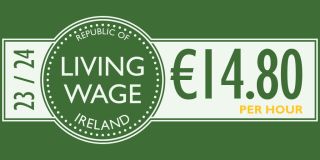Cost of living pressures push the Living Wage to €14.80 per hour

The reference hourly Living Wage rate will rise to €14.80 per hour for 2023/24. This represents a 6.9% (€0.95) change from the 2022/23 rate of €13.85 per hour. This is the minimum rate required for a full-time worker (without dependents) to afford the goods and services that people have agreed are essential for enabling a life with dignity.
The Living Wage rate calculated by the Living Wage Technical Group (LWTG) is evidence-based, building on budget standards research undertaken by the Vincentian MESL Research Centre at SVP, and reflects the real costs faced by employees in Ireland. The change to the annual Living Wage rate is determined by changes in living costs and income taxes.
Over the past year living costs have increased for most areas of expenditure included in the calculation. Within this, rising energy costs (+23%) and food costs (+21%) added €23 to the price of the average weekly basket. This significant pressure fuelled two-thirds of the required increase in the Living Wage rate.
Other areas of weekly expenditure which also grew notably include Personal Care (+9.2%), Social Inclusion (+6.3%), and Clothing (+5.9%). While Transport related costs decreased slightly (-2.0%).
Rent increases continue to be a significant factor pushing up the Living Wage rate, and increased by an average of 7.0% (almost €13 per week). The new Rent Tax Credit has limited the impact of rising rents on the Living Wage rate required. Without the Rent Tax Credit the hourly rate would have risen by a further €0.35 to €15.15.
The Living Wage is based on price levels at the time of calculation (changes up to March 2023). While the rate of inflation has reduced over recent months, living costs remain exceptionally high and official forecasts do not anticipate a return to earlier price levels. The ongoing cost of living changes will feed through to next year’s calculations – they will reflect price changes and the various supports outlined in Budget 2024 and in any future cost of living initiatives.
It is estimated that approximately one-in-five full-time workers are earning less than the Living Wage in Ireland and the gap between the National Minimum Wage (€12.70 per hour in 2024) and the Living Wage will be €2.10 per hour next year.
The Living Wage rate is based on the rationale that full-time employment will at least provide for a socially acceptable minimum standard of living for a single person without dependents. It represents the minimum required to meet physical, social and psychological needs, and enable a life with dignity.
This differs from the Government’s Living Wage which adopts a fixed threshold approach as opposed to the “basket of good” approach used by the LWTG. The Government’s living wage will be set at 60% of the median wage by 2026, which in 2024 is estimated to be €13.80 per hour.
Robert Thornton, Research Manager with the Vincentian MESL Research Centre and a member of the LWTG said: “The Republic of Ireland Living Wage was established in 2014 and is part of a growing international set of similar figures which reflect a belief across societies that individuals working full‐time should be able to earn enough to enjoy a decent standard of living and meet minimum essential living costs. Having an income below this standard of living means doing without goods and services which are essential for taking part in the norms of everyday life in Ireland.”
The Living Wage Technical Group was established in March 2014 and worked to establish a methodology for calculating the Republic of Ireland Living Wage – launched in July 2014.
Full Annual Paper and Technical Documents are available at www.livingwage.ie
Based on data from the Survey of Income and Living Conditions, in 2017 25.3% of employees were earning less than the living wage (€11.70 in 2017). The mean average hourly earnings was €22.19 and the median was €17.50. For those that stated they were working full time, 20.7% were earning less than the living wage. This is based on employees in all household types not just single adults.
